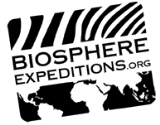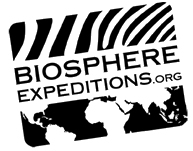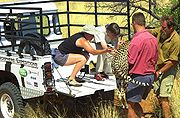
Biosphere Expeditions
Encyclopedia

Wildlife
Wildlife includes all non-domesticated plants, animals and other organisms. Domesticating wild plant and animal species for human benefit has occurred many times all over the planet, and has a major impact on the environment, both positive and negative....
research and conservation non-profit organization
Non-profit organization
Nonprofit organization is neither a legal nor technical definition but generally refers to an organization that uses surplus revenues to achieve its goals, rather than distributing them as profit or dividends...
whose main focus is to conserve the biosphere
Biosphere
The biosphere is the global sum of all ecosystems. It can also be called the zone of life on Earth, a closed and self-regulating system...
with volunteer-led scientific conservation
Conservation biology
Conservation biology is the scientific study of the nature and status of Earth's biodiversity with the aim of protecting species, their habitats, and ecosystems from excessive rates of extinction...
expeditions to several countries around the world. It was founded in 1999.
Goals and Projects
Biosphere Expeditions states its purpose as the promotion of sustainable conservation of the planet's wildlife by involving the public, with scientists across the globe on real hands-on wildlife research and conservation expeditions. Expeditions typically place interested people with no research experience alongside scientists widely accepted to be at the forefront of their conservation work. Anyone may join an expedition as there are neither special skills or fitness requirements nor age limitations.Biosphere Expeditions also advocates sustainable tourism
Sustainable tourism
Sustainable tourism is tourism attempting to make a low impact on the environment and local culture, while helping to generate future employment for local people. The aim of sustainable tourism is to ensure that development brings a positive experience for local people, tourism companies and the...
.
Biosphere Expeditions is listed as currently working in eight countries around the world; Oman
Oman
Oman , officially called the Sultanate of Oman , is an Arab state in southwest Asia on the southeast coast of the Arabian Peninsula. It is bordered by the United Arab Emirates to the northwest, Saudi Arabia to the west, and Yemen to the southwest. The coast is formed by the Arabian Sea on the...
, Honduras
Honduras
Honduras is a republic in Central America. It was previously known as Spanish Honduras to differentiate it from British Honduras, which became the modern-day state of Belize...
, Portugal
Portugal
Portugal , officially the Portuguese Republic is a country situated in southwestern Europe on the Iberian Peninsula. Portugal is the westernmost country of Europe, and is bordered by the Atlantic Ocean to the West and South and by Spain to the North and East. The Atlantic archipelagos of the...
(or more specifically the Azores
Azores
The Archipelago of the Azores is composed of nine volcanic islands situated in the middle of the North Atlantic Ocean, and is located about west from Lisbon and about east from the east coast of North America. The islands, and their economic exclusion zone, form the Autonomous Region of the...
), Spain
Spain
Spain , officially the Kingdom of Spain languages]] under the European Charter for Regional or Minority Languages. In each of these, Spain's official name is as follows:;;;;;;), is a country and member state of the European Union located in southwestern Europe on the Iberian Peninsula...
, the Altai Republic
Altai Republic
Altai Republic is a federal subject of Russia . Its capital is the town of Gorno-Altaysk. The area of the republic is . Population: -Geography:...
, Slovakia
Slovakia
The Slovak Republic is a landlocked state in Central Europe. It has a population of over five million and an area of about . Slovakia is bordered by the Czech Republic and Austria to the west, Poland to the north, Ukraine to the east and Hungary to the south...
, Namibia
Namibia
Namibia, officially the Republic of Namibia , is a country in southern Africa whose western border is the Atlantic Ocean. It shares land borders with Angola and Zambia to the north, Botswana to the east and South Africa to the south and east. It gained independence from South Africa on 21 March...
and Brazil
Brazil
Brazil , officially the Federative Republic of Brazil , is the largest country in South America. It is the world's fifth largest country, both by geographical area and by population with over 192 million people...
.

Snow Leopard
The snow leopard is a moderately large cat native to the mountain ranges of South Asia and Central Asia...
, cheetah
Cheetah
The cheetah is a large-sized feline inhabiting most of Africa and parts of the Middle East. The cheetah is the only extant member of the genus Acinonyx, most notable for modifications in the species' paws...
, dolphins, whales, coral reefs, wolf and bear
Bear
Bears are mammals of the family Ursidae. Bears are classified as caniforms, or doglike carnivorans, with the pinnipeds being their closest living relatives. Although there are only eight living species of bear, they are widespread, appearing in a wide variety of habitats throughout the Northern...
.
Biosphere Expeditions strives to make major contributions to research projects which otherwise would not take place without the organization’s support. The research on cetaceans in the Azores represent two such examples.
• This research was historically carried out annually during the period from late May to September. Since 2004, by reason of Biosphere Expeditions’ support through its volunteers and funding, the researchers expanded the width of the observation window by beginning in early April instead of late May. This extended period resulted in adding significant research data from the hundreds of sightings of rare animals such as baleen whales (blue, fin, sei, humpback and minke whales).
• The researchers typically add photo identification pictures of these animals to an international photo database of photos, known as the Photo ID Catalogue. Matthias Hammer, Biosphere Expeditions’ founder, states, “Animals passing the Azores are possibly going up to Iceland or Scandinavia, so we see these expeditions as vital in helping to both plot migration routes and estimate numbers.” Most project scientists believe it is only a matter of time before they can match animals seen in different years and/or different geographical locations. Expedition members for this project made a significant contribution by augmenting sperm whale research with their testing and validating computer software designed to match individual animals utilizing photographic imaging, similar to a facial recognition system
Facial recognition system
A facial recognition system is a computer application for automatically identifying or verifying a person from a digital image or a video frame from a video source...
, which compares other body features, such as the flukes, contained in the digital photographs. With several thousand sperm whale photo ID pictures in the North Atlantic catalogue, the success of this program will significantly reduce lab time by eliminating the manual visual comparisons.
History

Poland
Poland , officially the Republic of Poland , is a country in Central Europe bordered by Germany to the west; the Czech Republic and Slovakia to the south; Ukraine, Belarus and Lithuania to the east; and the Baltic Sea and Kaliningrad Oblast, a Russian exclave, to the north...
’s Carpathian Mountains during 2001. The project focused on wolves in the area and was instrumental in establishing a wolf hunting
Wolf hunting
Wolf hunting is the practice of hunting grey wolves or other lupine animals. Wolves are mainly hunted for sport, for their skins, to protect livestock, and, in some rare cases, to protect humans. Wolves have been actively hunted since 12,000 to 13,000 years ago, when they first began to pose...
ban there. Soon thereafter, Biosphere Expeditions’ portfolio grew and the organization opened additional offices in Germany
Germany
Germany , officially the Federal Republic of Germany , is a federal parliamentary republic in Europe. The country consists of 16 states while the capital and largest city is Berlin. Germany covers an area of 357,021 km2 and has a largely temperate seasonal climate...
, France
France
The French Republic , The French Republic , The French Republic , (commonly known as France , is a unitary semi-presidential republic in Western Europe with several overseas territories and islands located on other continents and in the Indian, Pacific, and Atlantic oceans. Metropolitan France...
, Australia
Australia
Australia , officially the Commonwealth of Australia, is a country in the Southern Hemisphere comprising the mainland of the Australian continent, the island of Tasmania, and numerous smaller islands in the Indian and Pacific Oceans. It is the world's sixth-largest country by total area...
and the USA.
In 2006, Biosphere Expeditions won the Best Volunteering Organisation award at the First Choice Responsible Tourism Awards held in London, followed by a "Highly Commended" award in the "Best for Protection of Endangered Species" category a year later.
Media
- Index of media coverage
- Here be snow leopards
- A game of cat and mouse
- Erin McCloskey's Namibian wildlife encounter
- Back from the wilderness
- The rare twitch project
- High time to sea
- Eco hero
- http://www.abendblatt.de/daten/2006/06/03/569998.html (German)
Awards
External links
- Biosphere Expeditions
- First Choice Responsible Tourism Awards 2006
- HCRF, local partner in Honduras
- Diwan of Royal Court, local partner in Oman
- Whale Watch Azores, local partner in Portugal
- Tambopata Expeditions, local partner in Peru
- Carpathian Wildlife Society, local partner in Slovakia EEAA
- Projecto Puma, local partner in Brazil
- Woodsmoke, local partner providing wilderness skills training for expedition leaders

